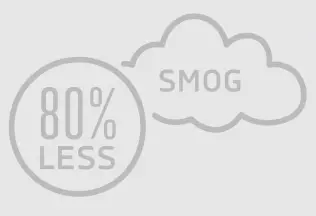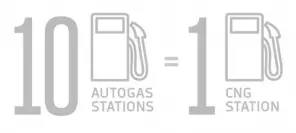- Main page
- Search
- Up to date
- Products
- Technology
- Vehicles
- Video
- Conversion Payback Simulator
Port Injection - Conversion Payback Simulator
Direct Injection - Conversion Payback Simulator
Diesel - Newsletter
LPG versus diesel the American way
 loading results...
loading results...Before we actually cite Propane's arguments favouring LPG autogas over diesel fuel, let us sketch a background to help you better understand the specifics of the US market. Up until recently petrol had been perceived as the only possible fuel for a passenger car. There were attempts in the 1970s and '80s to arouse interest in diesels among American drivers, but oil burners back then lacked power (they were naturally aspirated, unlike today – virtually every diesel is now turbocharged), generated billows of black smoke, smelled bad and made a lot of noise. The harm was done and Americans steered clear of diesel for decades – it wasn't until the 21st century that automakers (primarily European ones, who have mastered the art of making diesels tolerable) started offering diesel engines again. And yet, there seems to be no revolution in sight – diesel engines stateside are still primarily associated with huge semi-trucks, dumpers, agricultural and construction-site machinery as well as... locomotives. But since LPG autogas is mainly used in the US for commercial rather than passenger vehicles, many can be convinced to abandon diesel in favour of the gaseous fuel. And that's what arguments Propane uses for that purpose.
 © PropaneEnvironment may come after economy when it comes to naming the benefits of autogas, but it's still very significant
© PropaneEnvironment may come after economy when it comes to naming the benefits of autogas, but it's still very significantMore for the same money or the same for less money
This is always the supreme argument when it comes to convincing someone to choose LPG over any other fuel, be it conventional or alternative. Interestingly, in the US hardly anyone mentions the fact that nominal fuel economy (litres per 100 km or miles per gallon) actually deteriorates after the conversion, but since autogas is cheaper, it offers better cost-to-performance ratio (more power and torque for every dollar spent). From this perspective LPG is truly unmatched in terms of economy and there are state and federal tax breaks and incentives to further boost the effect – investments made into switching to LPG break even fast and savings grow quickly.
Lower cost of infrastructure
Even though you need a pressure vessel to store LPG and a regular tank to store diesel fuel, an autogas station is still more affordable. That's because the gaseous fuel is non-toxic and requires fewer safety measures. A vapour capturing system is also redundant since autogas is heavier than air. And since fleet operators often need to built their own refueling stations, they turn to LPG because it offers lower costs from day one.
Reduced maintenance costs
LPG-powered engines (like petrol ones) have less capacious oil systems, so each oil replacement (and these are rarer anyway) requires less oil to be purchased, which reduces costs. Also, vehicles running on autogas feature less complicated exhaust gas aftertreatment systems, without particulate matter filters or additional, urea-based catalytic converters reducing the amount of nitrogen oxides. On top of it all, training a mechanic to service and maintain LPG-powered engines and vehicles is less time-consuming and, of course, time is money...
Reduced noise levels
Buses running on autogas are up to 50% quieter than their diesel-powered equivalents. Lower noise levels mean more comfort for the passengers and driver, but also to other users of the road, including pedestrians. We may fail to notice it anymore because we've got used to it, but if all of a sudden all city buses, trucks and delivery vans (normally running on diesel) switched to LPG, we would totally hear a change for the better. Unfortunately, this isn't easy to execute in practice.
Less engine wear on idle
Excessive idling causes wear to diesel engines and non-warrantable failures. Not to mention the fact that idling is punishable in the US (and many other countries, too). Of course, idling isn't any more allowed when the vehicle is powered with LPG, but at least autogas causes less harm to the engine and the environment. But let's leave environment for now, we'll get to that in the right moment.
Commonplace availability
The US have more LPG than they can consume on their own and as long as the natural gas supply and demand keep growing, as long there will be an abundance of autogas (70% of American LPG comes from natural gas). This means choosing autogas over conventional fuels produced from imported crude oil creates new jobs and supports the country's energy safety and independence. And since Americans value independence a great deal, the number of fleet managers abandoning diesel in favour of LPG grows steady and fast.
Environmental record
Particulate matter is diesel engines' greatest problem. The issue is addressed and resolved through the use of DPF (diesel particulate filters), but the technology is neither cheap nor convenient. Switching from diesel to autogas eliminates particulate matter (nearly 100% of it) with a wave of the hand and on top of that emissions of compounds responsible for the formation of smog drop by as much as 80%. Besides, the WHO (World Health Organization) and the EPA (Environmental Protection Agency) have labelled diesel exhaust gasses as carcinogenic. Combusted LPG has far less negative impact on human health.
The American LPG industry sure knows how to promote their product. One may argue their informative brochures just go to state the obvious, but at least everything is gathered in one place, clearly stated and explained and backed by an organisation that has a name. We'd say what Propane did to compare autogas to petrol, CNG and diesel is an example to follow, even in countries with richer tradition of autogas use.







